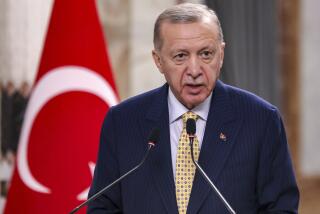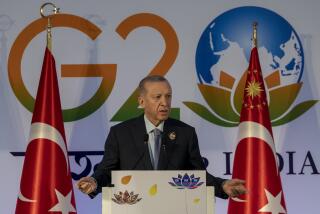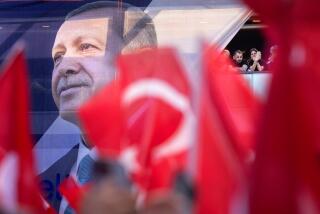Turkey’s big chance
- Share via
BETWEEN THE END OF WORLD WAR II and the beginning of the Cold War, President Harry S. Truman declared that a failure to aid Turkey would have negative ramifications “reaching to the West as well as to the East.”
What Truman knew then holds true today: Turkey remains the physical, cultural and strategic bridge between East and West. Lately, it has been reasserting that role, even at the expense of alienating its old Western allies. The United States and Europe need to prepare for and manage the inevitable disagreements ahead while soliciting a greater Turkish role in the troubled Middle East, beginning in Lebanon.
In the last few years, the secular Muslim state has practiced a diplomatic balancing act, intensifying its overtures to the liberal West while sending contrary signals domestically to its own illiberal nationalists. Before the Iraq war, Ankara refused the U.S. military the right to launch operations from within its territory, despite its history of supporting U.S. military action and its long membership in NATO.
In its attempt to become a full-fledged member of a reluctant Europe, Turkey rewrote its penal code to better protect human rights. But Ankara slipped in controversial Article 301, which mandates up to three years in prison for those who insult “Turkishness.” This odious law already has been used to shackle some of Turkey’s brightest writers and thinkers.
Last week, only days after a warning from EU Enlargement Commissioner Olli Rehn, Turkey freed one of its most prominent columnists charged under the law (for arguing against mandatory military service). But then, zagging the other direction, Turkey this week appointed a hard-line military chief -- who supports cross-border incursions against Iraqi Kurds -- in the wake of 15 Turkish soldiers being killed in the last three weeks, allegedly by Kurds. Turkish citizens, long intolerant of Kurdish separatism both at home and abroad, see such action as parallel to Israel’s offensive against Hezbollah in Lebanon.
So the balancing act grows more precarious by the day. With elections coming up next year, Turkish politicians are beating the nationalist drum. But a promising opportunity might open with Turkey’s proposed involvement in a peacekeeping force in Lebanon after a cease-fire with Israel is established. Turkey is an ideal candidate because of its historic role as mediator (or, sometimes, bulwark) between Europe and the Middle East. Having well-trained armed forces, good relationships with Syria and Iran, and a Muslim population doesn’t hurt.
Turkey would get a chance to boost its regional profile and pursue a more assertive -- and popular -- foreign policy while bolstering its ties to the West. Better to maintain a shaky balance than to lose the only secular Muslim ally the U.S. has.
More to Read
Sign up for Essential California
The most important California stories and recommendations in your inbox every morning.
You may occasionally receive promotional content from the Los Angeles Times.













